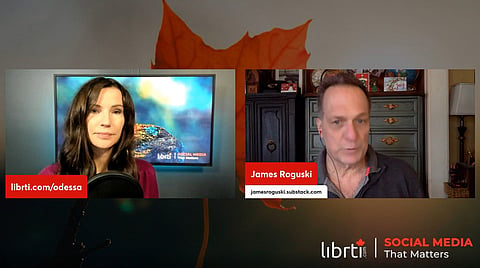

A watchdog says negotiations on the World Health Organization's pandemic accord are struggling to meet their deadlines and the public must not allow WHO to "cheat" by introducing late amendments.
James Roguski said WHO acknowledged on October 2 2022 they were unlikely to ratify the pandemic accord at the 77th World Health Assembly that begins May 27 this year.
“It's good news,” Roguski told interviewer Orlessa Orlewicz on Librti Talk Canada.
“It's been astonishing to me that nobody in the media has said a word about this because they don't want to advertise their failure.”
According to Article 55 of the International Health Regulations, any amendments to be considered at the WHO World Health Assembly must be tabled at least four months prior. This makes January 27 the deadline for proposed changes to the accord.
Dr. Abdullah Assiri from Saudi Arabia told a WHO meeting on October 2, "I believe we all share the same sentiment that, realistically, the whole package of amendments will probably not be ready by January 2024. We would like to ask the secretariat procedurally if we could not continue working until the [77th] World Assembly in May of 2024."
However, Roguski has found reason to expect the WHO will try to set aside their own rules. During the October 2 to 6 meetings, delegates saw a note on the screen that read, "The Co-Chairs noted that, in reference to Decision WHA75(9), it appeared unlikely that the package of amendments would be ready by January 2024. In this regard, the Working Group agreed to continue its work between January and May 2024. The Director-General will submit to the 77th Health Assembly the package of amendments agreed by the Working Group."
Roguski said the WHO has meetings on the accord scheduled for February and April and said the public must not allow them to “cheat” and sneak in amendments.
“If nobody's paying attention, they'll just keep negotiating and they'll try to slip something in at the last minute. They have to know very clearly that we understand the rules and we are not going to let them do that,” he said.
“Anything that they would consider in May of 2024, if they don't give us four months notice, it's all null and void.”
Roguski a researcher, author, natural health proponent and activist, said the process is more difficult than getting 196 people to agree on pizza toppings.
“They've been tasked with trying to get 196 nations to agree to what was originally 197 pages from 94 different countries submitting amendments, over 300 different changes to the International Health Regulations.”
Although some nations have openly opposed the pandemic accord for its potential sweeping powers, Roguski said most have been silent. He said the issues of contention behind closed doors are not about principles.
“The reason they're having these negotiations is essentially a trade dispute. It's got nothing to do with anyone's health. If anything, it's exactly the opposite,” Roguski said.
“A reasonable person would go, ‘Why are they arguing for more of these jabs? That doesn't make any sense in the world,’ until you realize that it's profitable. So what they’re negotiating over is how to profiteer off the next pandemic; everybody wants a piece of that pie.”
Roguski said the impetus for the pandemic accord came at a special session of the World Health Assembly in December 2021 where smaller nations wanted equal distribution of “pandemic-related products” and complained wealthier nations were “hogging” mRNA jabs.
“Fast forward two years, they're still arguing over that money. They want investment, … they want intellectual property, they want manufacturing plants to be built in their nations or their region and they want control so that they can launder their own money and make their own profits and give good deals to their own cronies,” Roguski explained.
“Well, it's not going well, because the wealthy nations don't want to let go of the intellectual property. And here, I’ll speculate just a little bit. They don't want to tell anybody how they actually make these products. They don't want that intellectual property to be known, because that's as incriminating as all get out.”
Roguski said “the greed of all these various nations is working to our benefit” to delay ratification of a bad accord.
“It's really very Marxist and totalitarian. They wanted to give the director general authority to declare an emergency… then under Article 13 A, which was a new article that was proposed by both Bangladesh and the African nations, he would have the authority to decide what products were needed for the emergency that he just declared,” Roguski explained.
“He would be empowered...to tell whatever nation had the capacity to manufacture that product, that they had to manufacture it and deliver it where it was needed.”
Roguski said public awareness was required to make Article 55 have teeth and force any agreed-on points off the version for ratification at the assembly in late May.
“Individual men and women all around the world…have awakened and they're speaking up. And there are relatively small numbers of politicians who have had the guts to do that,” he said.
“A lot of activists get it backwards. Before you're ever going to convince your government officials, you have to identify who your allies are amongst the people. And so, spread the word to everyone you possibly can. Have a little bit of fun with this. Say ‘Hey, do you know the significance of January 27, 2024?’”
